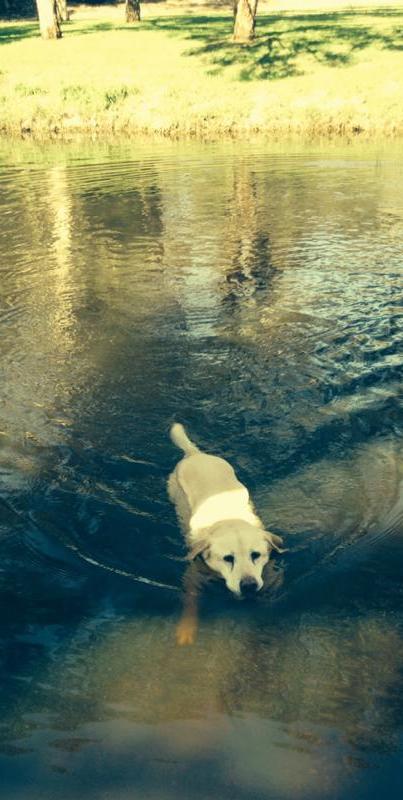Novelty (or Practical Habituation)
I have been thinking a lot of late about novelty in dog training. More technically, I’ve been thinking about habituation (i.e. a type of non-associative learning) and how it works in the ‘real world’ for changing dog behaviour in simple ways.

Dogs can habituate to water.
When I was a kid, I grew up with a chow chow called Ted. Ted mostly lived in the backyard, but as a child, I one day decided that Ted was going to get a walk every day. And so I walked him every day for about a month (before moving onto the next project, as kids do). Ted started the month with enthusiastic jumping regarding the prospect of a walk. He also vocalised a little bit. By the end of the month, Ted had the lead put on with no fuss, no jumping, no noise, and soldiered on for the walk.
Sure, I could’ve implemented some kind of training regime. But, in reality, I didn’t. Ted started the month thinking walks were novel, and his behaviour stemmed from this novelty. At the end of the month, he was habituated to the walk. Previously, the outside world meant a lot to him and resulted in him getting aroused. By the end of the month, it meant close to nothing, and his arousal levels were far less.
Then there’s our foster dog Bandit. I picked him up from his surrendering family, one hour from my house, and drove him home. He drooled, paced, and stressed the whole way home. On ever subsequent car trip, Bandit’s behaviour got more mild. Recently, I drove him to a boarding facility about 20 minutes away, and he was laying, asleep, by the time we got there. No training went into this. Bandit just ‘got over it’ because he habituated to the car – it became less novel.
I find many outside dogs are often ‘over the top’ when they meet people, and I think this is a novelty thing, too. If dogs only see people on an occasional basis (i.e. when you go outside), of course they’re going to be excited to see you! If they were inside and saw you constantly, their responses are going to be more mild. Indeed, with most attention seeking behaviours (e.g. jumping up, head nuzzling, vocalising), these behaviours will decrease if the dog has sufficient attention to start with. If attention is given liberally, the resource becomes less important, and the dog’s behaviour changes.
I think the concept of novelty is often overlooked in dog training. Sometimes, dog behaviour will ‘get better’ simply because the novelty of something wears off.
Doing many varied things often can do more than maintaining socialisation – it can reduce novelty and so also decrease undesirable behaviour associated with that novelty.
